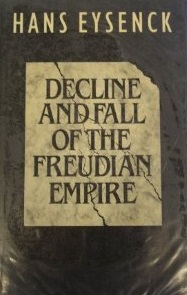Decline and Fall of the Freudian Empire

Cover of the first edition
|
|
| Author | Hans Eysenck |
|---|---|
| Country | United Kingdom |
| Language | English |
| Subject | Sigmund Freud |
| Published | 1985 (Viking) |
| Media type | Print (Hardcover and Paperback) |
| Pages | 224 (1986 Pelican edition) |
| ISBN | (1986 Pelican edition) |
Decline and Fall of the Freudian Empire (1985; second edition 2004) is a book by psychologist Hans Eysenck, in which Eysenck criticizes Sigmund Freud and argues that psychoanalysis is unscientific. The revised edition has a preface by the author's widow, Sybil Eysenck.
Eysenck argues that psychoanalysis is unscientific and that its theories are based on no legitimate base of observation or experiment and have the status only of speculation. Eysenck argues that the veracity of psychoanalysis is testable through traditional empirical means, and that in all areas where such tests have been carried out it has failed. Eysenck calls Freud, "a genius, not of science, but of propaganda, not of rigorous proof, but of persuasion, not of the design of experiments, but of literary art." According to Eysenck, Freud set back the study of psychology and psychiatry by around fifty years. Eysenck argues that the dreams Freud cites in The Interpretation of Dreams (1899) do not really support his theories, and that Freud's examples actually disprove his dream theory. Eysenck calls psychoanalyst Ernest Jones' The Life and Work of Sigmund Freud (1953-1957) the "most famous" biography of Freud, but sees it as "more a mythology than a history, leaving out as it does nearly all the warts and making many alterations to the portrait by suppressing data and items which might reflect unfavourably on Freud." Eysenck praises several works critical of psychoanalysis, including psychiatrist Henri Ellenberger's The Discovery of the Unconscious (1970), psychologist Frank Sulloway's Freud, Biologist of the Mind (1979), Jacques Van Rillaer's Les Illusions de la Psychanalyse (1980), and philosopher Adolf Grünbaum's The Foundations of Psychoanalysis (1984). He accepts Elizabeth Thornton's argument, made in Freud and Cocaine (1983), also published as The Freudian Fallacy, that Freud's patient Anna O. suffered from tuberculous meningitis.
...
Wikipedia
